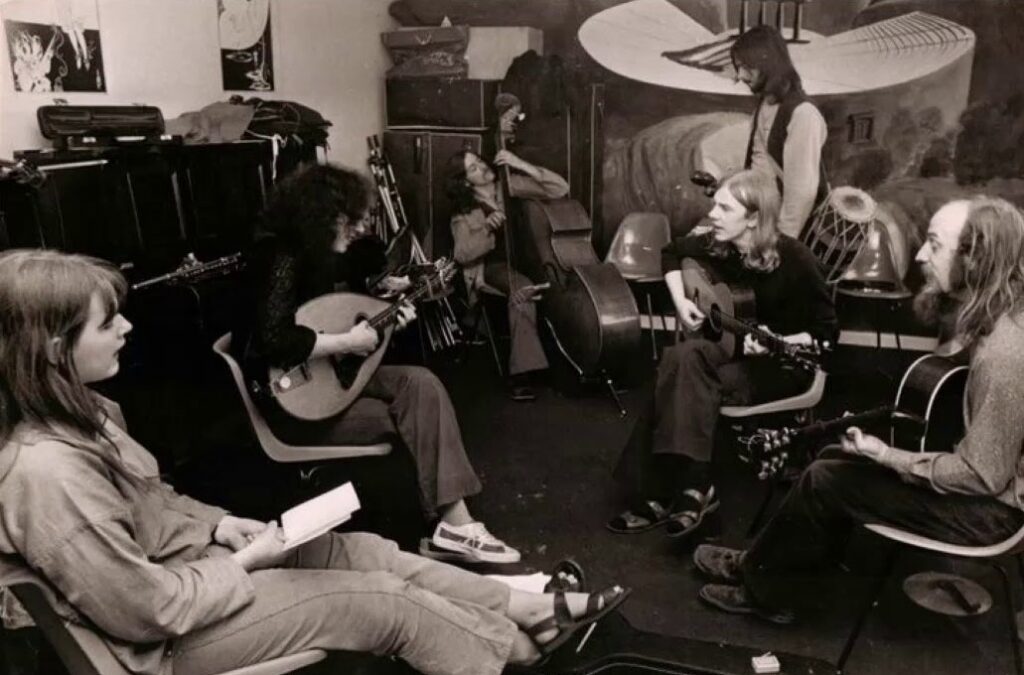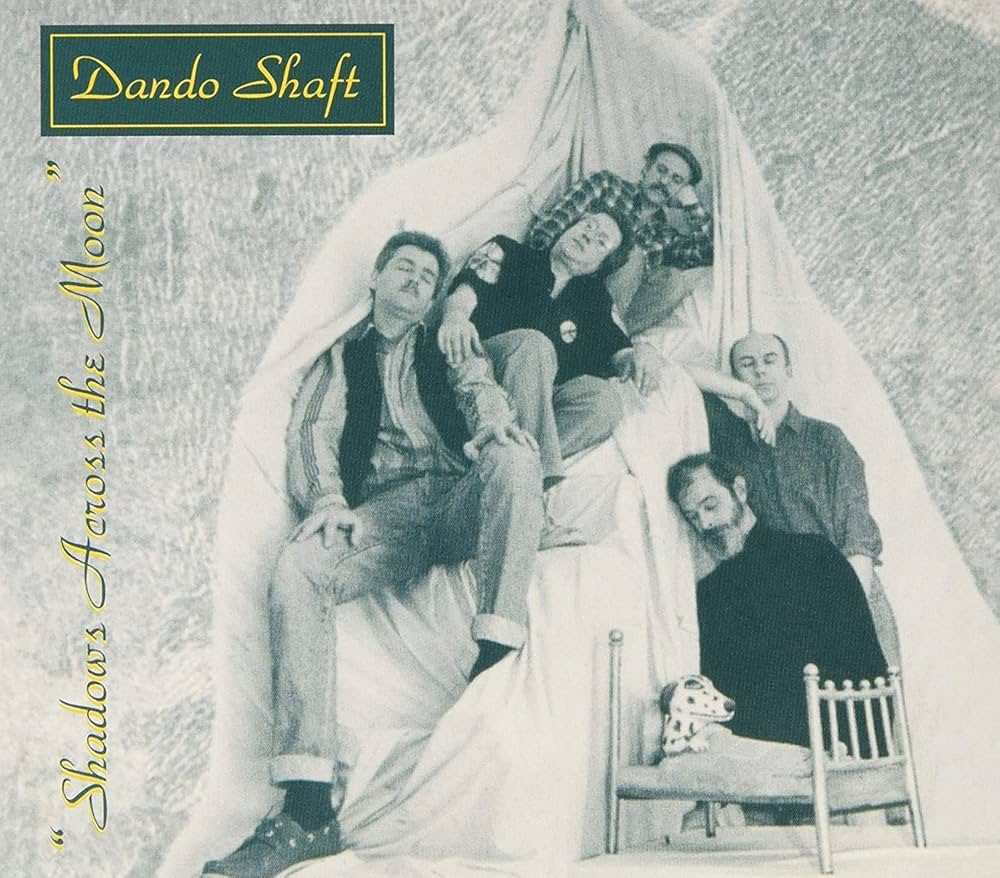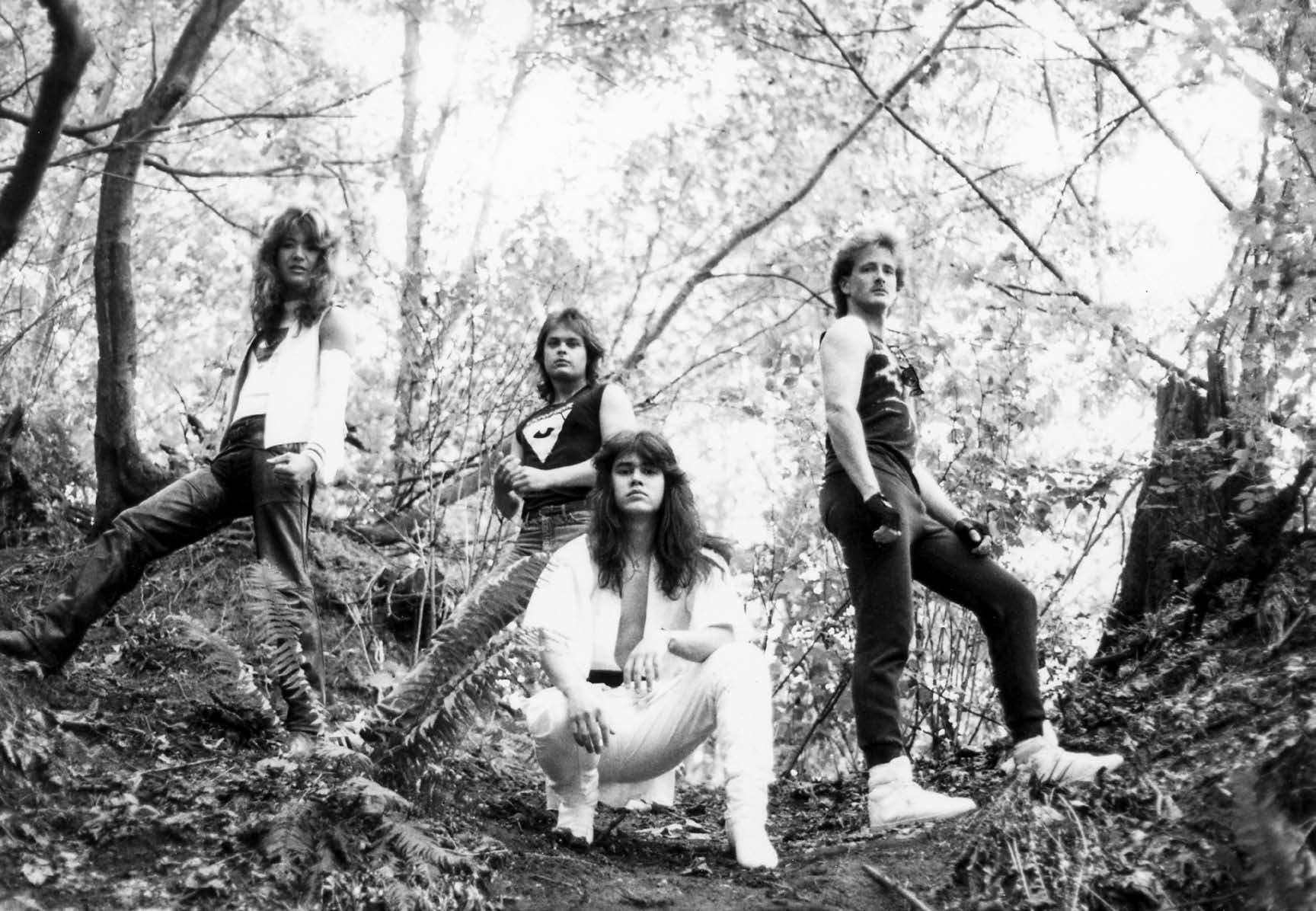Dando Shaft – ‘Shadows Across The Moon’
There aren’t many bands whose birthplace might, idiomatically, seem like an embargo from a period’s genre.
Not always in this case either, but often. They were never (officially) sent to Coventry but left there for five brief years 1968 to 1973. Named after a shady character in a yank pulp sex-thriller that nobody had heard of let alone, hopefully, read, Dando Shaft debunked to a communal house in leafy Ealing well-loaded with an intriguing blend of “good vibes and spirituality …an airy tapestry of influences resulting in a singular repertoire”.

So opines the triptych booklet in a welcome Talking Elephant Records reissue of a 1989 reunion gig in Bergamo’s old town in Italy at the magnificent Sala Piatt, first released in an Italy-only limited run then on Happy Trails six years later. The 60s band had been fronted by two guitarist/vocalists, Kevin Dempsey and Dave Cooper (both contribute to the booklet and had earlier gigged in local folk clubs as a duo), with multi-instrumentalist Martin Jenkins (vocal, guitar, mandolin, flute, fiddle etc.), Roger Bullen (upright bass) and Ted Kay on percussion not drums. They’d debated going electric but thought it might dilute their joyful, inspired magic, which at times sounds positively ethereal, especially after adding vocalist Polly Bolton from up the road in Leamington in October 1970, a pure and expressive singer who’d worked with June Tabor.
Less whimsical and more diurnal than Dr. Strangely Strange or ISB, less medieval and more coeval than Forest and Amazing Blondel, with the energy (but not wattage) of Trees, their very original sound isn’t quite like anyone else in music’s kaleidoscopic tapestry. This unique blend of quality musicianship in styles reflect a constantly progressive outlook, their website says legendary folk jazzers, and they should know. Keyed-up musical histories adapt freak folk, and this is a master class, pure and simple. Haunting as drift-smoke while on a hill in the middle of nowhere, they’re quite wonderfully pioneers of the genre.
It took off when they moved to London and replaced a cancellation at Pye Studios to cut a demo. This became an album when they recorded eight songs in four hours, with a second session for mixing and to correct a fluff on the instrumental Drops Of Brandy. It was produced by Miki Dallon, who had a failed label (Strike, which issued Roy Harper’s debut in ’67) and restarted with Young Blood Music on which appeared ‘An Evening With Dando Shaft’ in 1970, MCA in USA. The Dandos were signed to a shockingly unfair contract, Dallon still holding and profiting from the original tapes to this day! It was favourably reviewed and compared to Pentangle with a broader palette from Balkan to bluegrass, establishing their sound of many colours.
Due to friendship with Mathews Southern Comfort and John Martyn, they moved to their management agency, Axel, signing a contract for six albums over three years with an annual advance. They were hoping for a move to Island, their sound perfect for that innovative label, perhaps produced by Joe Boyd. Instead their second and eponymous LP was issued in mid-1971 as the fifth release of Neon, a new RCA subsidiary begun in March 1971 and famous for its art covers (by Pat Moran). Started by Olav Wyper, who had signed the Kinks and Sweet to the parent label, he tried to sign Dando Shaft earlier to Vertigo (whose logo he designed). Later buying Transatlantic, he left Neon which folded by the year-end after less than a dozen albums. Vertigo had worked on the basis that after 1500 units it would make a profit, so presumably it didn’t always happen for Neon.
Yet Dando Shaft briefly did chart stateside, moving to the parent company RCA for ‘Lantaloon’ (1972). Supporting bands such as Osibisa, Pentangle, Southern Comfort and Brian Auger at prestigious venues like the Roundhouse and Lyceum, they often appeared in concert and infrequently on radio e.g. two Peel sessions in June/September ’71 and January/March ’72 with nine songs overall, as well as In Concert in July with Heads, Hands & Feet. Five new songs were showcased on Stuart Henry’s programme on New Year’s Eve, just before signing to Neon. Their radio debut had been on BBC’s folk service, two of the songs still unreleased (‘Young Man;’ ‘Muntaz’). Their playing was with as much power as the electrified Steeleye Span and Fairport Convention, weaving intricate patterns through textures for a beguiling atmosphere, as if the essence of music as magic.
‘Cold Wind’/’Cat Song’ was a single on ‘Young Blood’ (1970), ‘Coming Home To Me’/’Kallyope Driver’ plus the almost Morris-like ‘Sun Clog Dance’/’This Gift’ both on RCA, the latter of July ’72 a slightly more commercial approach causing dissension in the group. They’d moved to rural Wales by the end of the year with families in tow, though Polly and Kevin stayed in west London. The group fractured, briefly reforming in 1977 for Kingdom when added electrics, drums and sax among other swag including guests, for their reputation still had kudos. Dempsey released an LP with Pentangle’s Jacqui McShee for example and toured America as a duo with Polly Bolton where he took part in sessions with Alice Coltrane and Aquarius; Bolton holds singing workshop today. Jenkins joined Hedgehog Pie then Southern Comfort and Whippersnapper with Dave Swarbrick as well as working with Richard Digance then Bert Jansch. As well as reissues on Trading Places, compilations appeared in 1994 in Germany and one of the three albums and radio in 2002. Three of the band have since exited the stage, Ted Kay (1944-2007), Martin Jenkins (1946-2011), and Roger Bullen (1946-2018).
After the appreciative audience reaction at the live recording following a week of rehearsals to peg the set-list, the group without Burton (Jenkins/Cooper/ Dempsey share the vocals) plus an accomplished guest violinist, Chris Leslie from Fairport and Whippersnapper, the group later returned to north Italy for a week-long tour. Eleven tracks are here, with most not all their most loved, what Dave Cooper overmodestly called “chord fragments and a well-turned phrase difficult to play on one’s own…that together made a kind of wonder”.
Where most tracks are around five minutes up to nearly eight, the shortest opens the set (Railway, from their second album) with chunky violin like a jigging fiddle. Rain opened the debut and is probably their most compiled and specialist radio play, here with Jenkins on mandocello. Slack-stringed guitar duels in a jazz-flavour mixing picking and strumming over tablas and male harmonies, followed by that sweet and easy ethos that sums them up in ‘If I Could Let Go,’ which with the more up tempo violin-driven ‘Feel Like I Want To Go Home’ reminds a little of the Buckleys or Nick Drake. One of their beautiful classics (Sometimes), with time -less lyrics from the folk tradition, removes the extreme vocal endings of the ’71 version augmented with delightful flute by Jenkins.
All the instruments blend on a percussive, symphonic elegy to their debut, while ‘Road Song’ opened ‘Lantaloon’ (’72) which disappointed some of the band. As with ‘Feel Like I Want To Go Home,’ the curve to the jazzier folk of later years including the lyrics is clear. This album’s title track delivers keening violin with vivid lyrical content colouring a dreamy tale-telling, followed by Riverboat which was originally famed for Polly Bolton’s vocals as a classic of that year yet is still mesmerizing here with orchestral violin and flute in heights reached by such as Amazing Blondel in the cathedral and Forest. This riverboat gliding through space and time can freeze a memory like cryogenics without its static view. The title track of Kingdom (1977) is the lone visit to that later work, gospel-like in patches about the age. The closer ‘Coming Back To Stay’ has rocking violin interplaying with a tight band for a joyous finale. Soundwaves always were their forte, though their lyrics hold gravitas.
It’s like stumbling unaware into the hidden entrance of a fairy hill to witness a celebration. Dando Shaft dance and sing about living in the day and days we go through, with smiles aplenty or reverie not so much nostalgic but as life is for living (without the cliché platitudes normal in modern music). A gem of a release from a real treasure stash.
Brian R. Banks
Dando Shaft – ‘Shadows Across The Moon’ (Talking Elephant Records TECD449)




